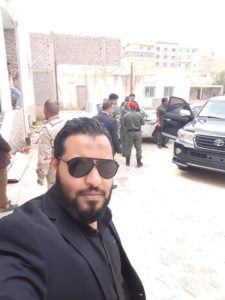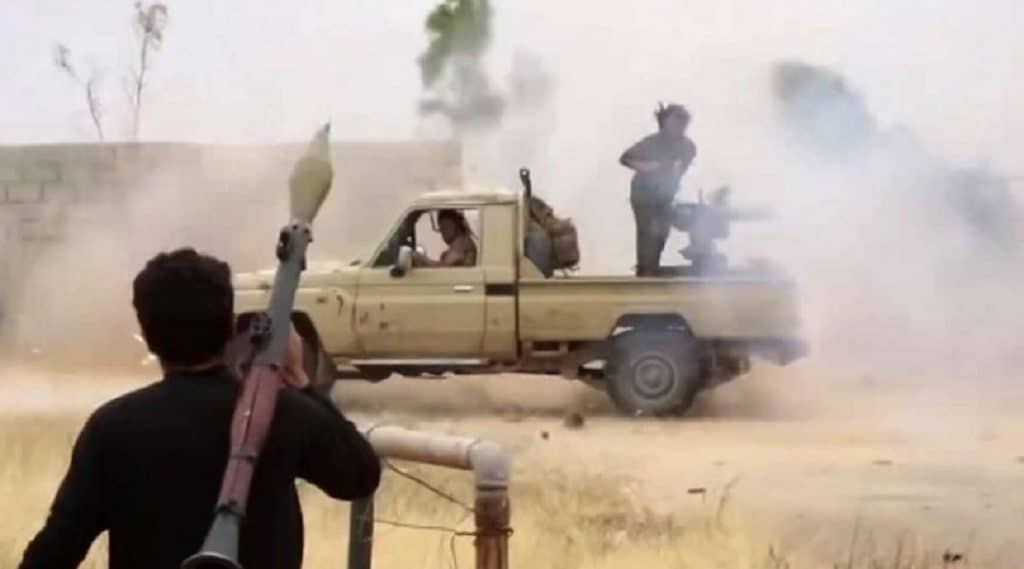The Moscow and Berlin conferences on Libya demonstrated the desire of most countries of the international community to resolve the long-standing conflict between the Libyan National Army and the Government of National Accord.
Russia, Germany and France were ready to act as guarantors of a truce between the warring parties in Libya. However, the head of the Al-Vefak government, Fayez al-Sarraj and the Libyan National Army did not comply with the cease fire. In addition, the process of resolving the Libyan crisis was significantly complicated by Turkey, which through Libya seeks to reach its own geopolitical tasks.
Especially for World Geostrategic Insights, Denis Korkodinov talked about this with a Libyan political analyst and National Army outreach specialist, Ibrahim Elbadri.
 1. On February 18, 2020, units of the Libyan National Army launched a missile strike on a Turkish warship, which was stationed in the port of Tripoli. As a result, the Government of Libya’s National Accord announced the suspension of its participation in the UN peace talks in Geneva. Does this mean that the decisions of the Berlin Conference on Libya were actually blocked by Fayez al-Sarraj, and therefore another escalation of the Libyan conflict is expected in the near future?
1. On February 18, 2020, units of the Libyan National Army launched a missile strike on a Turkish warship, which was stationed in the port of Tripoli. As a result, the Government of Libya’s National Accord announced the suspension of its participation in the UN peace talks in Geneva. Does this mean that the decisions of the Berlin Conference on Libya were actually blocked by Fayez al-Sarraj, and therefore another escalation of the Libyan conflict is expected in the near future?
IBRAHIM ELBADRI: Regional players intervened in the Libyan crisis in 2011 to protect civilians. Nevertheless, today some of the countries support the Al-Vefak government, providing it with legitimacy and support in confronting the Libyan National Army, which creates the basis for the escalation of the conflict.
The Government of National Accord was initially created with a view to compromise between the various political and military groups represented in Libya. However, this goal was not achieved, as a result of which the disunity of Libyan society became even greater. Among other things, the Al-Vefak government was not able to show political will and independence in making crucial government decisions. And when Fayez al-Sarraj went to Berlin to participate in the international conference on Libya, he did not seek dialogue. The conference was necessary for him in order to gain time and stop the advance of the Libyan National Army, which almost approached Tripoli. Fayez al-Sarraj understood that he would inevitably be defeated if, through the organization of the negotiation process, the international community did not stop the advance of the forces of Khalifa Haftar. In addition, the leader of the Government of National Accord used the site in Berlin to confirm his alliance with Turkey, which began to actively intervene in the conflict. In this regard, it is not surprising that large deliveries of Turkish weapons to Libya were organized just during the Berlin Conference, which turned into a cover for violations of the international embargo.
In turn, Ankara is not configured to comply with the ceasefire in Libya. Fayez al-Sarraj is forced to submit to Turkish politics, on which his future depends. In other words, the Al-Vefak government has become “hostage” of Turkey.
The Libyan National Army’s attack on the Turkish warship in the port of Tripoli was supposed to demonstrate that Turkey, contrary to the decisions of the Berlin Conference, is regularly delivering weapons to Libya, which casts doubt on the truce between the warring parties. And the fact that Fayez al-Sarraj subsequently used the attack on a Turkish ship as an excuse to refuse to participate in the Geneva meetings, indicates that the Government of National Accord is not interested in resolving the Libyan conflict.
2. On February 19, 2020, the Turkish president announced the start of a large-scale military operation in the Syrian province of Idlib against the government forces of Bashar al-Assad, which Russia supports. At the same time, the commander of the Libyan National Army, Khalifa Haftar, decided to begin preparations for the assault on Tripoli, which Turkey supports. In this regard, is there a relationship between the development of conflicts in Libya and Syria? How can Khalifa Haftar’s army push Turkish troops out of Libya? Is there any feedback channel between the Libyan National Army and the Turkish army operating in Libya? Indeed, to date, the Turks have not made any serious attacks on the position of the Libyan National Army. In this regard, it is logical to assume that today the Turks have some kind of non-aggression agreement.
IBRAHIM ELBADRI: There is no doubt that there is a correlation between the complexity of the scene in Tripoli and the escalation of hostilities in Idlib.
Turkey aims to reach a Russian-Turkish deal in Idlib at the expense of Russia’s position on the Libyan issue and its support. Meanwhile, the Russians did not abandon their Libyan friends, believing that in case of refusal of intervention, Libya could turn into a second Syria. Khalifa Haftar has the same understanding. It is for this reason that he rejected the resolution, the adoption of the results of the Berlin Conference.
As for the scene in Idlib, Turkey has increased the intensity of its military attacks to put more pressure on Russia. And then Recep Erdogan did not hide his anger at the refusal of Khalifa Haftar to sign the Turkish agreement. He said that the refusal to sign the agreement by the commander of the Libyan National Army occurred under the influence of Russian President Vladimir Putin. Therefore, the Turkish leader decided to take revenge on Moscow by sending his armed forces to the Syrian province of Idlib, where the risk of a direct military clash with the Russians is extremely high.
3. On February 16, 2020, the Sheikh Al-Tahir Al-Zawi Charitable Foundation organized a conference in Tripoli on the theme of “Security and stability of Libya: duty and necessity”. At the same time, the leader of the Sunni tribes Al-Zawi expects the escalation of the conflict in Libya, and therefore calls on all parties to the confrontation to dialogue. It is worth noting that Al-Zawi is an ally of the military commander of Khalifa Haftar. Does this indicate that through the Sheikh Al-Tahir Al-Zawi Charitable Foundation, Khalifa Haftar invites the Government of National Consent to initiate a peace dialogue? What is the role of the Sheikh Al-Tahir Al-Zawi Charity Fund in Libya? Can Sheikh Al-Tahir Al-Zawi convince Fayez al-Sarraj to comply with the ceasefire in Libya?
IBRAHIM ELBADRI: The Sheikh Al-Tahir Al-Zawi Charitable Foundation is a long-established humanitarian institution. However, it has no effect on the armed forces in Tripoli. International players are most likely keen to use this fund as an alternative negotiating platform. But the peacekeeping role of this fund is extremely modest, as a result of which it is unlikely to be able to change the existing alignment of forces in Libya.
4. The European Union decided to create new military forces to monitor Libyan territorial waters in the Eastern Mediterranean in order to counter illegal arms transfers. What do you think about this? Can the European Union guarantee the observance of the international arms embargo on Libya? What is the opinion of the Libyan National Army regarding the plan of the European Union to create an international maritime coalition off the coast of Libya?
IBRAHIM ELBADRI: The decision of the European Union to create new armed forces to monitor Libyan territorial waters is a wonderful and logical step. This international initiative has found a positive response from Khalifa Haftar. As a result of this, we expect that European Union intervention will help block Turkish arms shipments.







